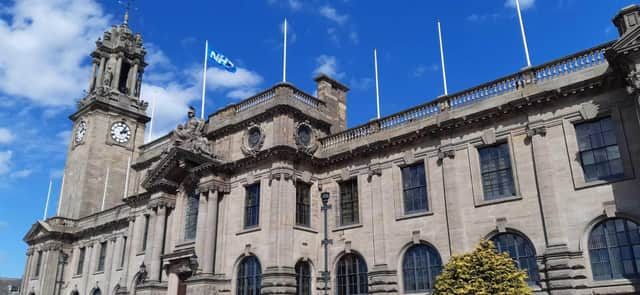South Tyneside councillors could be banned from wearing T-shirts, jeans, and flip flops at meetings as part of proposed dress code


South Tyneside Council is looking to introduce a new elected member dress code to help “ensure a positive image” of the local authority at all times.
The proposals are part of a wider refresh of the council’s constitution which is set to be formally approved next month.
Advertisement
Hide AdAdvertisement
Hide AdAccording to documents prepared for the council’s Constitution Committee this week, the dress code would require councillors to “present a smart image,” particularly at public meetings such as full council.
The proposed rules say “business-like dress is appropriate” in all situations, which can include “smart trousers, skirts, dress, sari, shalwar kameez, shirt or blouse, a suit jacket or blazer and tie.”
Any “head covering appropriate to faith and clothing that satisfies traditions of ethnic, cultural and religious background may [also] be worn at all times.”
In addition, the proposed dress code sets out an explicit list of clothing items that would not be allowed in public council meetings, committees and sub-committees.
Advertisement
Hide AdAdvertisement
Hide AdUnder the proposed rules, councillors would not be allowed to wear:
Baseball caps. T-shirts. Sportswear or training clothes (e.g. tracksuits, shorts and football shirts). Jeans. Flip flops. Trainers.
A draft of the proposed updated constitution was discussed at Wednesday’s (April 28) Constitution Committee.
The document states that “the way elected members present themselves during council meetings has a direct bearing on the council’s image.”
Advertisement
Hide AdAdvertisement
Hide AdAccording to the proposed dress code, any councillor who “attends public meetings inappropriately dressed may be asked by the Mayor or relevant committee chair to leave the meeting to change or may not be called upon to speak.”
The report adds: “In all circumstances, the mayor or relevant committee chair will first remind an elected member of the dress requirements for public council meetings and the need to dress appropriately for the next meeting.
“The Mayor or relevant committee chair will have the discretion to excuse a councillor from complying with the dress code, upon receiving a satisfactory explanation or request from the councillor for not being appropriately dressed.”
Councillors unable to comply with the dress code due to disability or a health reason will also be granted a dispensation by the Mayor or relevant committee chair for all meetings,“for as long as the condition applies.”
Advertisement
Hide AdAdvertisement
Hide AdDuring discussion on the proposed constitution changes this week, independent councillor Glenn Thompson raised concerns about how the dress code would work in practice.
He said he opposed the prospect of a councillor being asked to leave a meeting under the rules.
Cllr Thompson went on to say: “Whilst personally I fully support the dress code, I fully support it only as a recommendation.
“It would be wrong to potentially have a ward’s elected member removed from a meeting and not being able to represent residents because of fashion.”
Advertisement
Hide AdAdvertisement
Hide AdLabour councillor Joan Atkinson, who chaired the Constitution Committee, said the proposed constitution changes would allow councillors to give an explanation for their clothing at meetings, if required.
“It was about trying to apply a standard of dress which people would aspire to and try and stick to but obviously, to give people an opportunity then to give a reason why they couldn’t do so,” she said.
Labour councillor Geraldine Kilgour added: “I think it’s appropriate that we present ourselves, when we need to, in a very professional and business-like [way]."
All English councils have been required to have constitutions since 2000, which describe the way in which a council conducts its business, how it operates and how decisions are made.
In recent months, a major overhaul of South Tyneside Council’s constitution has been taking place with an aim of improving transparency, openness and accountability.
This includes clearer rules on what information is available to elected councillors and members of the public and more ‘plain English’ to help the public understand council procedures.
Following endorsement from the Constitution Committee on Wednesday, the proposed changes to the constitution will be recommended to full council for adoption.
A final decision will be made at the annual meeting on May 18.